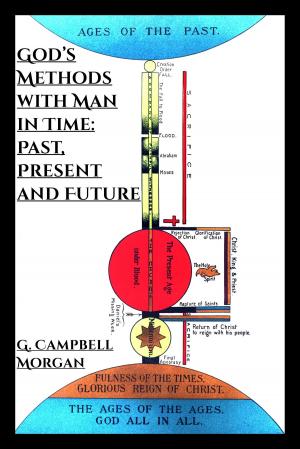Creation Speaks
A Study of the Scientific Aspects of the Genesis Record of Creation and the Flood
Nonfiction, Religion & Spirituality, Christianity, Christian Science, Bible & Bible Studies, Study, Old Testament, Christian Literature| Author: | Harold W. Clark | ISBN: | 1230001941135 |
| Publisher: | CrossReach Publications | Publication: | September 28, 2017 |
| Imprint: | Language: | English |
| Author: | Harold W. Clark |
| ISBN: | 1230001941135 |
| Publisher: | CrossReach Publications |
| Publication: | September 28, 2017 |
| Imprint: | |
| Language: | English |
This book is for the layman, not for the scientist. It is intended to be non technical and non-argumentative, for the author is convinced that the fundamental principles regarding science and the Bible can be expressed in ordinary everyday language. Its purpose is to present the viewpoint of a creationist with respect to scientific problems involved in a literal interpretation of Genesis.
It is a good thing for a writer on a controversial subject such as this to state his fundamental philosophy at the beginning. Accordingly it may be said that the basic assumptions upon which this treatise is built are these:
- The Bible is the inspired word of God from Genesis to Revelation.
- The Genesis record of the creation and early days of this earth is not allegorical or of the nature of myth or folklore, but is an inspired historical record.
- Any true scientific theory regarding the origin and early history of the earth and its life must agree with a plain, simple, obvious rendering of that record.
Clear distinction must be made between the facts of science and theories by which scientific data are interpreted. To all men the facts must be the same, because facts cannot be changed; on the other hand, the interpretation of the facts may vary according to one’s background of training and experience.
Hence we should ever be careful to separate scientific facts from theories which, while they may aid in the search for truth, should not be confused with the’ truth itself.
Belief in evolution or creation, either one, is based upon certain assumptions. The evolutionist must assume that the earth is very ancient, with its age reckoned in billions of years. The forces of nature are assumed to have been at work in a more or less uniform manner throughout the long ages of geological time. And finally, those forces are assumed to have been resident in nature.
Whether resident forces are inherent from all eternity, that is, automatically present, without the intervention of any supreme being, or whether endowed by the power of God at some vaguely distant “beginning,” makes little difference. The presence of resident forces, by which nature behaves as a self-operating mechanism, is an essential part of the evolutionary philosophy.
The creationist, on the other hand, if he accepts the Genesis record literally, is committed to a short chronology. This does not imply that Ussher’s chronology is necessarily correct in every detail. However, the history of the earth is to be reckoned in terms of thousands rather than millions or billions of years.
Such a viewpoint must of necessity involve faith in supernaturalism as opposed to the acceptance of naturalism by the evolutionist. And, instead of nature’s being a self-running mechanism, it is understood by the creationist to be under the direct and continuous control of the power of an infinite God.
This book is for the layman, not for the scientist. It is intended to be non technical and non-argumentative, for the author is convinced that the fundamental principles regarding science and the Bible can be expressed in ordinary everyday language. Its purpose is to present the viewpoint of a creationist with respect to scientific problems involved in a literal interpretation of Genesis.
It is a good thing for a writer on a controversial subject such as this to state his fundamental philosophy at the beginning. Accordingly it may be said that the basic assumptions upon which this treatise is built are these:
- The Bible is the inspired word of God from Genesis to Revelation.
- The Genesis record of the creation and early days of this earth is not allegorical or of the nature of myth or folklore, but is an inspired historical record.
- Any true scientific theory regarding the origin and early history of the earth and its life must agree with a plain, simple, obvious rendering of that record.
Clear distinction must be made between the facts of science and theories by which scientific data are interpreted. To all men the facts must be the same, because facts cannot be changed; on the other hand, the interpretation of the facts may vary according to one’s background of training and experience.
Hence we should ever be careful to separate scientific facts from theories which, while they may aid in the search for truth, should not be confused with the’ truth itself.
Belief in evolution or creation, either one, is based upon certain assumptions. The evolutionist must assume that the earth is very ancient, with its age reckoned in billions of years. The forces of nature are assumed to have been at work in a more or less uniform manner throughout the long ages of geological time. And finally, those forces are assumed to have been resident in nature.
Whether resident forces are inherent from all eternity, that is, automatically present, without the intervention of any supreme being, or whether endowed by the power of God at some vaguely distant “beginning,” makes little difference. The presence of resident forces, by which nature behaves as a self-operating mechanism, is an essential part of the evolutionary philosophy.
The creationist, on the other hand, if he accepts the Genesis record literally, is committed to a short chronology. This does not imply that Ussher’s chronology is necessarily correct in every detail. However, the history of the earth is to be reckoned in terms of thousands rather than millions or billions of years.
Such a viewpoint must of necessity involve faith in supernaturalism as opposed to the acceptance of naturalism by the evolutionist. And, instead of nature’s being a self-running mechanism, it is understood by the creationist to be under the direct and continuous control of the power of an infinite God.















